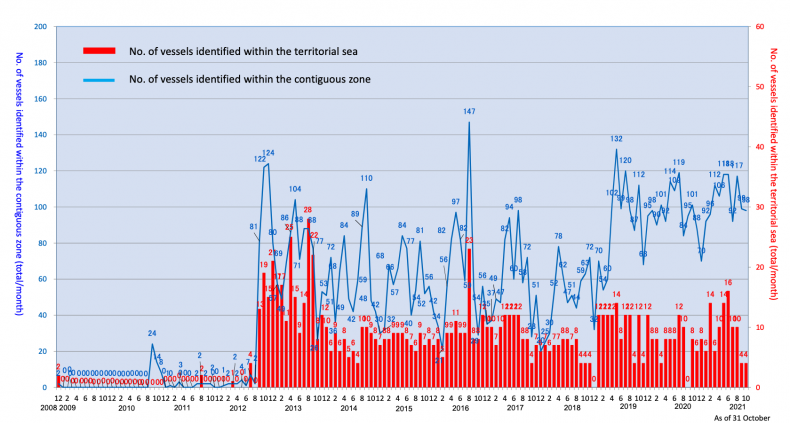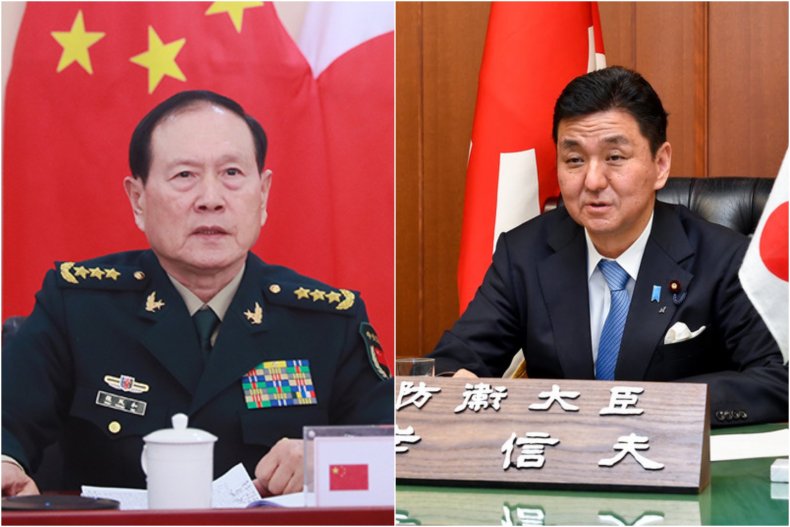Senior defense officials from Japan and China held their first high-level dialogue of the year on Monday, in which both sides clashed over disputed islands in the East China Sea but also agreed to establish a hotline in order to avoid physical conflict.
During the virtual talks between Japanese Defense Minister Nobuo Kishi and his Chinese counterpart, Gen. Wei Fenghe, the former aired Tokyo's "grave concerns" about China's military and coast guard activities, according to Japan's Defense Ministry readout.
Tokyo and Beijing have overlapping claims to the Senkaku Islands, an uninhabited island chain that has been administered by Japan for several decades. China calls the island group Diaoyu and says it has a historical claim to them.
Japan has observed increasingly frequent China coast guard (CCG) activity around the Senkakus since it "nationalized" the islets in 2012. However, the frequency and duration of CCG patrols escalated further after Beijing passed a controversial coast guard law this past February, permitting its armed "white hull" vessels to fire upon foreign ships.

Kishi, who is the younger brother of former Japanese Prime Minister Shinzo Abe, "strongly called for self-restraint," said the ministry. He also "delivered strong concerns toward China's uncertain growth of defense budget without transparency, as well as modernization and reinforcement of its military forces," it said.
A holdover who served under Abe, Yoshihide Suga and now incumbent PM Fumio Kishida, Kishi is part of a ruling party faction that is decidedly pro-Taiwan and therefore openly skeptical about China's intentions toward the democratic island, which Beijing also claims as part of its territory. Monday's dialogue included a pointed reference to "peace and stability across the Taiwan Strait," which Kishi said "is extremely important for Japan's security as well as stability of the international community."
The linking of Taiwan's safety to Japan's own security has been something of a theme in 2021, ever since Suga met President Joe Biden at the White House in April. The internationalization of the decades-long cross-strait impasse has been touted by some Japanese commentators as Suga's greatest foreign policy achievement during his short time in office.

China's Wei offered a relatively tamer response to Kishi's many concerns. According to the Chinese Defense Ministry's readout, the senior official called China and Japan "important neighbors and cooperative partners." He also drew attention to next year's 50th anniversary of formal bilateral relations between the two governments.
"General Wei stressed that China will firmly safeguard its territorial sovereignty and maritime rights and interests," the Chinese readout said. "He called on both sides to bear in mind the big picture of bilateral relations and make joint efforts to maintain stability in the East China Sea."
Wei's only reference to self-ruled Taiwan, which is becoming increasingly guarded toward Beijing, was to emphasize "China's principled position on multiple issues," the ministry said. This included unspecified points about "the Asia-Pacific region, the Taiwan question and the South China Sea issue."
Both China and Japan should "jointly control risks, prevent the escalation of conflicts and continuously improve the level of defense cooperation," Wei told Kishi. Both defense chiefs confirmed plans to create a telephone hotline to that aim. The crisis management tool will be operational by the end of 2022, the Japanese readout noted.
On Monday, Japan's Kyodo News reported that Japanese defense forces held drills on a remote island to simulate an armed attack on the disputed Senkakus—an incident that would trigger an American response under the U.S.-Japan Security Treaty. The exercise took place on Tsutara—part of the Goto island group in Nagasaki Prefecture—involved the Japan Self-Defense Forces, the Japanese coast guard and police, the report said.
The Hawkish Chinese Communist Party tabloid the Global Times described the drills as "exposing Japan's right-wing militarist ambitions and its failure to reflect on history." The move was "obviously a provocation targeting China," said the paper.

Post a Comment